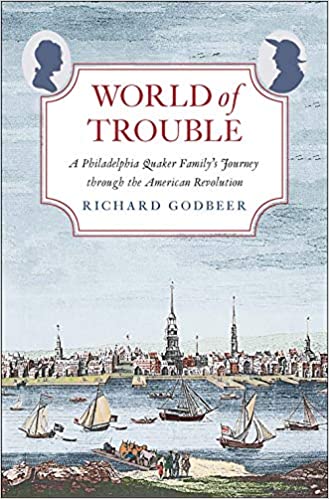Authors:
Historic Era: Era 3: Revolution and the New Nation (1754-1820s)
Historic Theme:
Subject:
Fall 2020 George Washington Prize | Volume 65, Issue 8


Authors:
Historic Era: Era 3: Revolution and the New Nation (1754-1820s)
Historic Theme:
Subject:
Fall 2020 George Washington Prize | Volume 65, Issue 8
Excerpted from the George Washington Book Prize finalist World of Trouble: A Philadelphia Quaker Family’s Journey through the American Revolution, by Richard Godbeer (Yale University Press).

It was September 11, 1777, and the moment that 42-year-old Elizabeth Drinker had been dreading was finally arrived.
Elizabeth's husband, Henry, her senior by one year and a prosperous Quaker merchant, was among thirty men who had been arrested a week before on suspicion of treason. Pennsylvania's patriot government had brought no formal or specific charges against these individuals, but most were Quaker pacifists who refused to fight with or otherwise support either side in the War for Independence. The prisoners, locked up in a makeshift prison at the Masonic Lodge in Philadelphia, had written several letters of protest, denouncing their treatment and demanding a formal hearing. The Supreme Executive Council had informed them in turn that they must swear "allegiance to the Commonwealth of Pennsylvania, as a free and independent state," or suffer the consequences.
Only a third of the prisoners took the oath and secured their freedom; twenty remained in prison, nineteen of them Quakers. Their families and friends, outraged by what Elizabeth called "the tyrannical conduct of the present wicked rulers," visited them daily, waiting anxiously to see what would happen next. The revolutionary government had decided to send the prisoners to Virginia as exiles, with their ultimate fate uncertain. Most of the detainees were men of property, and the council had promised that they would be allowed to depart in their own carriages, as befitted gentlemen, but that promise was now broken, and they were to leave instead in wagons commandeered for the occasion.
The moment of departure turned out to be emotionally fraught and violent. Sarah Fisher, wife of prisoner Thomas Fisher, recorded in her diary that the prisoners were "dragged" outside into the wagons "by force" and then "drove off surrounded by guards and a mob." Yet not all of those who gathered to watch were hostile to the twenty men. When the time came for the prisoners' removal, wrote Thomas Gilpin, another of the exiles, the surrounding streets "were crowded by men, women, and children, who by their countenances sufficiently though silently expressed the grief they felt on the occasion.'"
As wagons carried the exiles away, torn from their loved ones, gunfire resounded in the distance. Elizabeth noted in her diary that the town was "in great confusion" that day. Patriot soldiers were fighting a few miles distant at the Battle of Brandywine to halt the British advance toward Philadelphia, and now her husband had disappeared into a war-ravaged landscape from which he might never reemerge. Elizabeth could not find the words to describe the prisoners' departure,